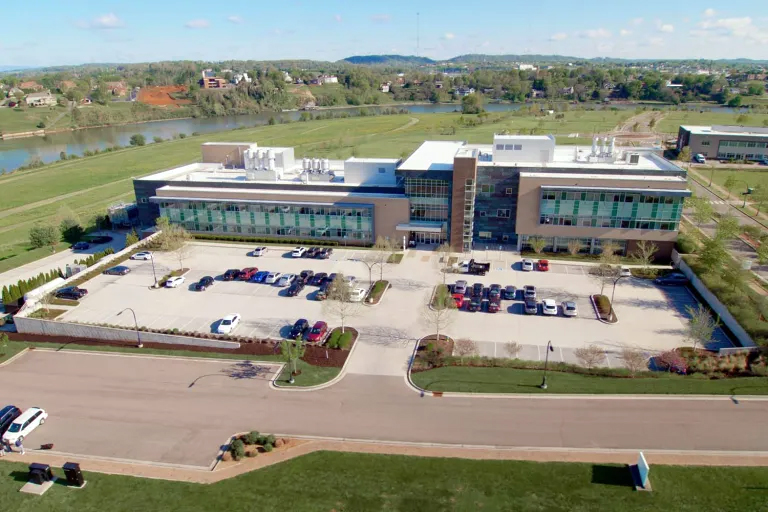Crosscutting collaboration produces measurable gains for UT.
In addition to the University of Tennessee, Knoxville’s record enrollments, rising student retention rates, historic alumni giving, and unprecedented state funding, its colleges and institutes had a record-setting year for research expenditures, topping $318 million for fiscal year 2022.
Collaboration drives innovation at UT. Since arriving in 2020, Deborah Crawford, vice chancellor for research, innovation, and economic development, has worked with UT leaders, faculty, and external partners to identify strategic priorities that build on the institution’s strengths in order to position Tennessee as a leader in the global innovation economy.

Deborah Crawford
Crawford explained, “Public-private partnerships and the Volunteer commitment to tackle grand-scale societal problems form the cornerstone of our thriving research and innovation ecosystem. Our faculty, staff, and students collaborate with partners the world over to solve some of the most pressing challenges of our time.”
UT is making significant contributions toward those pressing challenges through global leadership in materials and manufacturing, securing and sustaining the health of the planet, and a growing footprint in artificial intelligence and computing. Building on the momentum of a record-setting year, UT is proving to be a research institution on the rise.
Here are some 2022 research highlights:
Global leadership in materials and manufacturing
UT has long been recognized as a leader in materials science and engineering. This year the university’s polymer science program was ranked first among global universities in U.S. News and World Report’s 2022 Best Global Universities.
The National Science Foundation–funded Engineering Research Center for Hybrid Autonomous Manufacturing: Moving from Evolution to Revolution was announced, in which UT serves as a core partner and will bring expertise in advanced manufacturing processes, process modeling and machine learning, and workforce development.
UT also launched the Institute for Advanced Materials and Manufacturing, bringing together more than 160 faculty members to focus on materials and manufacturing research, innovation, and workforce development. The institute hosted 13 startups participating in the incubator and accelerator programs of the Spark Innovation Center and partnered with the TechStars Industries of the Future accelerator in Knoxville to support 10 more new businesses.

Institute of Advanced Materials and Manufacturing
Securing and sustaining the health of our planet
UT ranks sixth nationally for research supported by the US Department of Energy, according to the National Science Foundation’s FY20 Higher Education Research and Development survey, and boasts a large faculty community from multiple disciplines committed to delivering a clean energy future. Many of UT’s energy programs not only have global applications but are also making a measurable impact on the state of Tennessee.
The UT Institute for Agriculture received a $30 million US Department of Agriculture award to lead a partnership of 28 southeastern universities, trade associations, and nonprofit and for-profit organizations in the development and implementation of climate-smart grasslands, agriculture markets, and practices. Faculty, staff, and students will collaborate with 245 working farms to improve soil carbon storage, reduce greenhouse gas emissions, and maintain operational profitability and resiliency.

Kevin Heaslip
Building on Tennessee’s strengths in electric vehicle and battery manufacturing, an upcoming statewide initiative focused on the development of sustainable mobility solutions will expand into new areas, including the development of smart solutions to reduce carbon footprints. Kevin Heaslip joined UT as the new director for the Center for Transportation Research and will lead this initiative.
The Tennessee Department of Environment and Conservation is working with Professor of Chemistry Shawn Campagna and UT–Oak Ridge National Laboratory Governor’s Chair for Microbiology and Civil and Environmental Engineering Frank Loeffler to inform state-mandated monitoring of PFAS—or “forever chemicals”—in drinking water, facilitating statewide efforts to reduce PFAS contamination and improve the health of all Tennessee residents. Campagna and Loeffler recently published research outcomes that can help mitigate nationwide environmental contamination of PFAS in both the natural environment and humans.
A growing footprint in artificial intelligence and computing

Lynne Parker
Lynne Parker, former deputy chief technology officer and director of the National Artificial Intelligence Initiative Office within the White House, will lead the university’s new AI Tennessee Initiative. Parker will work to build upon UT’s current strengths in AI and position the university and the state of Tennessee as leaders in the data-intensive knowledge economy.
AI Tennessee builds on UT’s long-established reputation in computing. In March, Distinguished Professor of Computer Science Jack Dongarra was recognized with the ACM Turing Award for his pioneering contributions to numerical algorithms and libraries that enabled high-performance computational software to keep pace with exponential hardware improvements for over four decades.
In the near future, UT will complement its faculty expertise and capabilities in AI through a cluster hire focused on cognitive neuroscience-inspired AI solutions—in particular, dynamic learning and its neural foundations, a cornerstone of human intelligence.
Research on the rise
Bold leadership at all levels has helped UT think differently about research, its translation into innovation, and new social and economic opportunities.
Research expenditures in both the College of Social Work and the College of Education, Health, and Human Sciences rose by 45 and 13 percent, respectively, in 2022. Lori Messinger, dean of the College of Social Work, attributed the increase to strategic internal investments as well as targeted research projects addressing important national and global problems.
“The recruitment of Associate Dean for Research Doug Coatsworth, the development of new faculty support mechanisms, and investment in the college’s research infrastructure have helped our faculty and staff researchers to thrive,” said Messinger. “Faculty and staff in our research centers—the Social Work Office for Research and Public Service and the Center for Behavioral Health Research—have developed new research and service projects addressing grand challenges.”
In her 2022 Flagship Address, UT Chancellor Donde Plowman stated, “As the world gets more complicated, the solutions to some of society’s biggest, biggest challenges can be found at the intersection of the natural and social sciences, engineering, and the humanities.”
With a continued commitment to invest in faculty, students, and infrastructure, and a focus on cross-cutting, diverse collaboration, UT aims to create a more just, prosperous, and sustainable future for the state of Tennessee and the world beyond.
—
CONTACT:
Christie Kennedy (865-974-8674, ckennedy@utk.edu)
